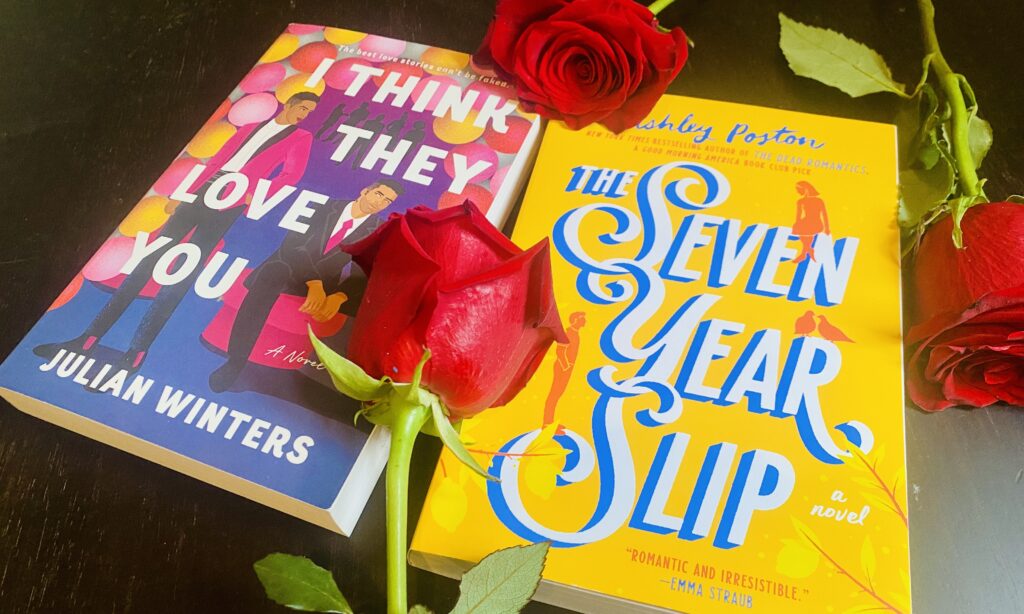Recently, a male British writer and a female American writer discussed their book genres on an episode of his podcast, Writer’s Routine. That sounds like a Meet Cute, but it was more of a bad Hinge date.
This man suggested to his guest that perhaps it “made more sense” to write thrillers rather than romances. Made more sense? I found myself yelling at the podcaster, who was not actually in my kitchen. (This happens a lot these days.)
“Listen up, Dan,” I harangued the tinny voice from my phone, “Has the great drama in your life involved a car chase? A bank heist? Hiding from the mafia? No, I didn’t think so. It involved a girl or boy in sixth form that you still can’t get over or an unrequited crush on your sibling’s hot best friend. Admit it. Nothing makes more sense than trying to understand love!”
Fortunately, romance readers have podcasts too, and book readings and dedicated book stores, and they may be the nicest readers in America. My local book shop just celebrated the latest novel by Julian Winters (I Think They Love You). Winters, who writes charmingly about Black, queer love, was interviewed by Ashley Poston (The Seven Year Slip, A Novel Love Story), whose speculative romances soar high in the Book Tok charts. It was an evening filled with excited fans who laughed frequently and soaked up every warm and wise moment. Romance readers, it turns out, crave happily-ever-afters wherever they can find them, including at a joy-filled bookstore on a Thursday night.
Despite my disdain for the arrogant British podcaster, some of my favorite romances do come from across the pond. Perhaps I appreciate the lack of ethereal “swoon” in British romances. Happy endings feel more sweetly earned with smoking, sulking characters consistently miserable until they tumble reluctantly into the right relationship.
The British writer David Nicholls followed up his wildly successful One Day (you read it or saw the movie or binged the television series) with the endearingly melancholy You Are Here. Marnie, a copy editor, and David, a geology teacher, meet in the muck when a mutual friend organizes what turns out to be an endless, rainy slog through the British countryside. As their other companions drop out of the trip (and who can blame them?), Marnie and David soldier on for days, keeping each other company with witticisms, pub crawls, and divorce war stories. Nicholls perfectly captures the way wounded middle-aged folks often venture towards love, as gingerly as stepping over craggy rocks in a slick rainstorm, hope forcing one boot in front of the other.
Many late-night soggy confessions and hungover mornings can also be found in the work of Mhairi McFarlane, the Scottish romance writer whose layered stories should please fans of Emily Henry. Grab any MacFarlane book for a hilarious, poignant read; I’m a particular fan of Just Last Night. This story about the trials and tribulations of a group of friends starts out in classic rom-com fashion, with a Try to Pick Up the Bartender scene that had me laughing out loud. When sudden tragedy strikes, Just Last Night swerves into a poignant examination of friendship in all its forms. Is there also a romance? Of course there is, complete with an enemies-to-lovers trope. And the object of affection is a male model, for heaven’s sake.
Yet the real beauty in MacFarlane’s writing, as in all of the best of this genre, is in how romance is never defined as the grand solution to all of life’s problems. Friendships, family ties, and other issues of identity come into play, often given the same importance as resolving the question of “Will they or won’t they?”
They will, of course, but the modern romance also asks: What else will they do? What else matters? These novels exist as far more than vacation companions; they offer inspiration for all the kinds of love that we long to welcome into our lives. The tropes may vary, as may the level of silliness or spice, but smart rom coms offer up an encouraging order of operations: We fix ourselves and we go all in on friendship, then romance comes along to make a good life even better. In this era of Galantines Before Valentines, nothing makes more sense to me than that.

